National Book Critics Circle “honors outstanding writing and fosters a national conversation about reading, criticism and literature.”
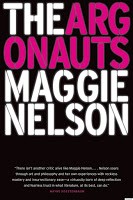 The Argonauts by Maggie Nelson
The Argonauts by Maggie Nelson
“Maggie Nelson’s The Argonauts is a genre-bending memoir, a work of “autotheory” offering fresh, fierce, and timely thinking about desire, identity, and the limitations and possibilities of love and language. At its center is a romance: the story of the author’s relationship with the artist Harry Dodge. This story, which includes Nelson’s account of falling in love with Dodge, who is fluidly gendered, as well as her journey to and through a pregnancy, offers a firsthand account of the complexities and joys of (queer) family-making. Writing in the spirit of public intellectuals such as Susan Sontag and Roland Barthes, Nelson binds her personal experience to a rigorous exploration of what iconic theorists have said about sexuality, gender, and the vexed institutions of marriage and child-rearing.” publisher
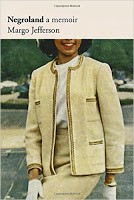 Negroland by Margo Jefferson
Negroland by Margo Jefferson
“At once incendiary and icy, mischievous and provocative, celebratory and elegiac—here is a deeply felt meditation on race, sex, and American culture through the prism of the author’s rarefied upbringing and education among a black elite concerned with distancing itself from whites and the black generality while tirelessly measuring itself against both. Born in upper-crust black Chicago—her father was for years head of pediatrics at Provident, at the time the nation’s oldest black hospital; her mother was a socialite—Margo Jefferson has spent most of her life among (call them what you will) the colored aristocracy, the colored elite, the blue-vein society. Since the nineteenth century they have stood apart, these inhabitants of Negroland, “a small region of Negro America where residents were sheltered by a certain amount of privilege and plenty.”” publisher
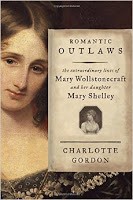 Romantic Outlaws: the extraordinary lives of Mary Wollstonecraft and her daughter Mary Shelley by Charlotte Gordon
Romantic Outlaws: the extraordinary lives of Mary Wollstonecraft and her daughter Mary Shelley by Charlotte Gordon
“This groundbreaking dual biography brings to life a pioneering English feminist and the daughter she never knew. Mary Wollstonecraft and Mary Shelley have each been the subject of numerous biographies, yet no one has ever examined their lives in one book—until now. In Romantic Outlaws, Charlotte Gordon reunites the trailblazing author who wrote A Vindication of the Rights of Woman and the Romantic visionary who gave the world Frankenstein—two courageous women who should have shared their lives, but instead shared a powerful literary and feminist legacy.” publisher
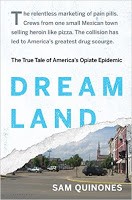 Dreamland: the true story of America’s opiate epidemic by Sam Quinones
Dreamland: the true story of America’s opiate epidemic by Sam Quinones
“In 1929, in the blue-collar city of Portsmouth, Ohio, a company built a swimming pool the size of a football field; named Dreamland, it became the vital center of the community. Now, addiction has devastated Portsmouth, as it has hundreds of small rural towns and suburbs across America–addiction like no other the country has ever faced. How that happened is the riveting story of Dreamland. With a great reporter’s narrative skill and the storytelling ability of a novelist, acclaimed journalist Sam Quinones weaves together two classic tales of capitalism run amok whose unintentional collision has been catastrophic.” publisher
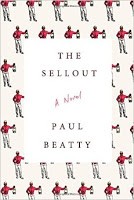 The Sellout by Paul Beatty
The Sellout by Paul Beatty
“A biting satire about a young man’s isolated upbringing and the race trial that sends him to the Supreme Court, Paul Beatty’s The Sellout showcases a comic genius at the top of his game. It challenges the sacred tenets of the United States Constitution, urban life, the civil rights movement, the father-son relationship, and the holy grail of racial equality―the black Chinese restaurant. Born in the “agrarian ghetto” of Dickens―on the southern outskirts of Los Angeles―the narrator of The Sellout resigns himself to the fate of lower-middle-class Californians: “I’d die in the same bedroom I’d grown up in, looking up at the cracks in the stucco ceiling that’ve been there since ’68 quake.” Raised by a single father, a controversial sociologist, he spent his childhood as the subject in racially charged psychological studies. He is led to believe that his father’s pioneering work will result in a memoir that will solve his family’s financial woes. But when his father is killed in a police shoot-out, he realizes there never was a memoir. All that’s left is the bill for a drive-thru funeral. Fuelled by this deceit and the general disrepair of his hometown, the narrator sets out to right another wrong: Dickens has literally been removed from the map to save California from further embarrassment. Enlisting the help of the town’s most famous resident―the last surviving Little Rascal, Hominy Jenkins―he initiates the most outrageous action conceivable: reinstating slavery and segregating the local high school, which lands him in the Supreme Court.” publisher




